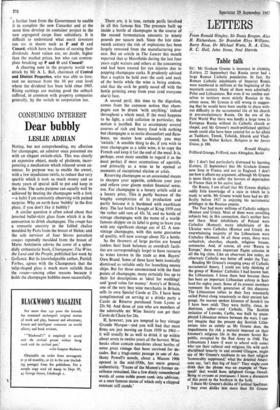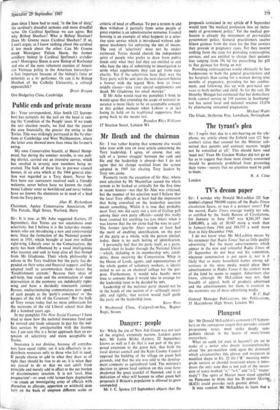Sir: I don't feel particularly distressed by learning (Letters, 22
September) that Mr Graham Greene now lives in France and not in England. I don't see how it affects my argument, although Mr Greene is more likely to suffer the horrors of deportation in France than in his native land.
On Russia, I am afraid that Mr Greene displays oddly little knowledge of a state in which he is ready to settle. Mr Greene would have had no dif- ficulty before 1917 in enjoying his sacramental privileges in the Russian empire.
The Tsar had many millions of Catholic subjects (Roman and Uniat). Most of them were unwilling subjects but, in this connection, that's neither here nor there. Most inhabitants of Poland were Catholics (Roman); many inhabitants of the Ukraine were Catholics (Roman and Uniat). An overwhelming majority of the Lithuanians were Catholics (Roman). In all these areas, there were cathedrals, churches, chapels, religious houses, seminaries. And, of course, all over 'Russia in Europe,' there were important Papist colonies in all the big cities. Like an observant Jew today, an observant Catholic was better off under the Tsar.
Reading Mr Greene's sweeping away of Catholic sacramental theory, I could not help thinking of the group of 'Russian' Catholics I had known best, the Lithuanians. I knew them best because there has been an important Lithuanian colony in Scot- land for eighty years. Some of its present members represent the fourth generation of this diaspora. The Lithuanians (often to their fury innocently called Poles) clung tenaciously to their ancient lan- guage, the nearest spoken kinsmen of Sanskrit (so I have been told). They were thrifty, clean, in- dustrious, sober—and Catholic. The Scottish imitation of Lourdes, Carfin, was built by unem- ployed Lithuanian miners between the wars. I can- not imagine that the present day Scottish Lithu- anians take as calmly as Mr Greene does, the impediments (to risk a meiosis) imposed on their kinsmen's religious life in the present Soviet Re- public, occupied by the Red Army in 1940. The Lithuanians I knew (I went to school with some) who ran their cultural and religious life with such disciplined tenacity in and around Glasgow, might say of Mr Greene's readiness to see their religion 'honourably suppressed,' what the detested Ameri- cans say, 'isn't that big of him?' They might even think that the phrase was an example of 'New- speak' that• would have delighted Gorge Orwell. Being td croyant ni pratiquant, I leave a discussion of this point to the brethren in the faith.
I share Mr Greene's dislike of Cardinal Spellman. I may even dislike him more than Mr Greene
does since I have had to read, 'in the line of duty,' the cardinal's dreadful sermons and more dreadful verse. On Cardinal Spellman we can agree. But why Bishop Sheehan? Who is Bishop Sheehan? Does Mr Greene mean Cardinal Sheehan? If so, I can't argue, as I know nothing about this cardinal if too much about the other. Can Mr Greene mean Monsignor Fulton Sheen, the former auxiliary bishop in Cardinal Spellman's archdio- cese? Monsignor Sheen is now Bishop of Rochester and one of the most vehement enemies of Ameri- can Vietnam policy in the American hierarchy— a fact important because of the bishop's fame or notoriety as a 'iv performer. Or can it be Bishop Sheehan of the Catholic University, a cultural apparatchik?







































 Previous page
Previous page